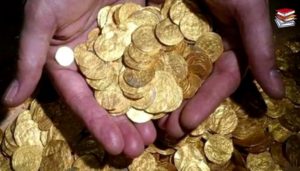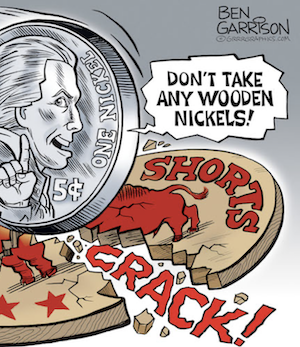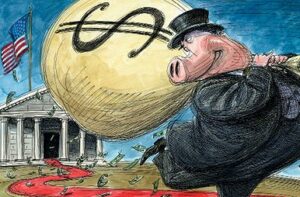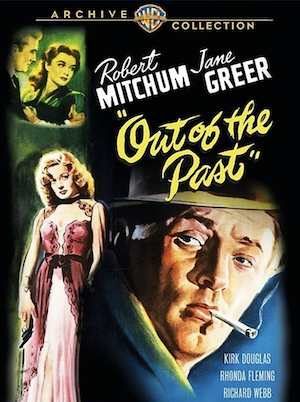 Historically, gold has never been viewed as a speculation. It was simply money: cash in the most basic form. It was a medium of exchange and a store of value. People did not accumulate gold because it could make them wealthy, but because it was a convenient, liquid way to keep the wealth they had.
Historically, gold has never been viewed as a speculation. It was simply money: cash in the most basic form. It was a medium of exchange and a store of value. People did not accumulate gold because it could make them wealthy, but because it was a convenient, liquid way to keep the wealth they had.
It’s only very recently, since 1971 – when the U.S. government proved unable to keep the price at $35 – that gold has been viewed as a speculation. In those days gold was an ideal speculation, with minimal risk but a huge upside.
Gold has been in a free market for three decades now; the frenzy of the ‘70s that took the metal from $35 to more than $800 disappeared, and was followed by a 21-year bear market. As a result, an entire generation of investors has grown up thinking that gold is not only not money but an investment dog. Their thinking is about to change. I believe that not only will gold again be used as money, but that it has entered a new long-term bull market.
Before looking at where the metal’s price is likely to go over the next few years, however, it’s worthwhile to consider some of the fundamentals… fundamentals that not 1 in a 1,000 people understands.
 ~ The Questions ~
~ The Questions ~
Any discussion of gold always comes back to certain basic questions: Why is gold money? Why is gold valuable? Why can’t money be whatever we say it is? (The last question is usually asked by government officials because they don’t know the answers to the first two.) Why does gold give rise to all kinds of controversy not associated with, say, platinum or lead? Why is the stuff an emotional, political statement for those who love it and for those who hate it?
~ The Answers ~
Over thousands of years, in billions of transactions by millions of humans, many commodities have been used as money: stones, salt, cattle, and seashells among them. But wherever gold was available, it tended to displace other media of exchange. Like any successful money, gold never needed to be decreed “legal tender” by a government; it was recognized as the most desirable money by common consent because of its unique properties.
Certain materials have proven especially well suited for certain uses. Aluminum is good for airplanes, bricks for construction, paper for books, and gold for money. If bricks were used for airplanes and aluminum for books, the results would be as sub-optimal as when paper is used for money.
In fact, the properties required of money were first described by Aristotle in the fourth century BC.
1) It is durable – It won’t evaporate, mildew, rust, crumble, break, or rot. Gold, more than any other solid element, is chemically inert. This is why foodstuffs, oil or artwork can’t be used as money.
2) It is divisible – One ounce of gold – whether bullion, coin, or dust – is worth exactly 1/100th of one hundred ounces. When a diamond is split, its value may be destroyed. You can’t make change for a piece of land.
3) It is convenient – Gold allows its owner physically to carry the wealth of a lifetime with him. Real estate stays where it is. An equivalent value of copper, lead, zinc, silver, and most other metals would be too heavy.
4) It is consistent – Only one grade exists for 24-carat gold, so there is no danger of owning 24-carat gold varying in quality. Twenty-four-carat gold (pure gold) is the same in every time and place since gold is a natural element, unlike gems, artwork, land, grain, or other commodities.
5) It has intrinsic value – Gold finds new industrial uses each year. Of all the metals, it is the most malleable (able to be hammered into sheets less than 5-millionths of an inch thick), most ductile (a single ounce can be drawn into a wire 35 miles long), and the least reactive (it can stand indefinite immersion in seawater, does not tarnish in air, and can withstand almost any acid). Next to silver, it’s the most conductive of heat and electricity and the most reflective of light.
These superlatives make gold uniquely well suited as a medium of exchange and a store of value. Arguments that gold’s value is “mystical” are silly; it is simply one of the 92 natural elements.
One important last point was not listed by Aristotle, probably only because he lived before the creation of paper and banking.
6) Gold cannot be created by government – Gold can, of course, be debased with impurities or falsified in weight, and governments strapped for revenue have tried those tricks. But a trader can protect himself with a pair of scales or a vial of acid, although a familiar and trustworthy hallmark of a coin saves him that trouble. Unlike currency, gold cannot lose value because of government mismanagement. On the contrary, it tends to gain value because of government mismanagement.
 But isn’t that latter point largely academic, since gold isn’t presently used as money anywhere in the world? I think not. Even though the concept still receives little discussion, and none in “official” circles, gold is likely in the foreseeable future to reassume its traditional role as money worldwide.
But isn’t that latter point largely academic, since gold isn’t presently used as money anywhere in the world? I think not. Even though the concept still receives little discussion, and none in “official” circles, gold is likely in the foreseeable future to reassume its traditional role as money worldwide.
I have no doubt that gold will again regain its traditional role of money, but only after it is trading at far higher prices than it is today. Wait and see.
Until then, there is nothing wrong with viewing gold as a speculation.
By Doug Casey, date unknown
[Got physical… close at hand?]
Let’s do something about that…
 Protecting Your Wealth is heard at 3:00 p.m. (Eastern Time), each Tuesday and Thursday on Republic Broadcasting Network. Jeffrey Bennett, host of the program will be sharing over 60 years of his personal experience in the precious metals markets, in addition to educational commentary regarding YOUR financial health and welfare.
Protecting Your Wealth is heard at 3:00 p.m. (Eastern Time), each Tuesday and Thursday on Republic Broadcasting Network. Jeffrey Bennett, host of the program will be sharing over 60 years of his personal experience in the precious metals markets, in addition to educational commentary regarding YOUR financial health and welfare.
Kettle Moraine, Ltd.
P.O. Box 579
Litchfield Park, AZ 85340
1 – 602 – 799 – 8214
gold@kettlemorainepreciousmetals.com








